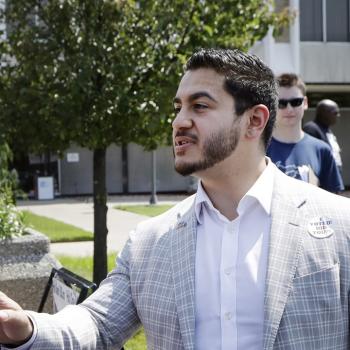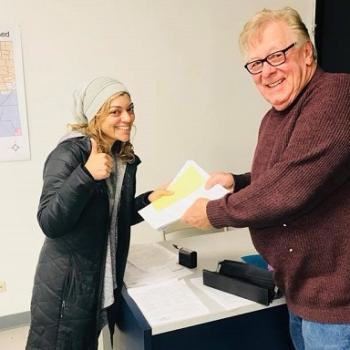 |
|
Salam from the heartland
|
Back in 1992, a relatively obscure film from Britain called “Wild West,” starring the now well-known actor Naveen Andrews, revolved around young British-Pakistani Muslims who loved country music and tried to hit it big in Nashville. The comedic value of the film was galvanised by the unlikelihood of such an unusual cross-cultural leap. But for Oklahoma native Kareem Salama, a budding country singer who explicitly draws from Islamic themes, life isn’t the clash of cultures you may think it is. Salama, whose parents immigrated to America from Egypt, is a product of the Midwestern environment he grew up in, fused with his Muslim upbringing. Kareem released his self-marketed debut album, “Generous Peace” last year and toured sporadically around the US (performing for a crowd at the annual ISNA conference) and the UK (sponsored by the Home Office-supported Radical Middle Way project) to curious, and ultimately appreciative, audiences. He released a special single, “Prayers at Night” to focus attention on last summer’s war in Lebanon. Outside of Muslim circles, Kareem is finding notoriety for the living dichotomy he is, in an American musical landscape where the closest Islam has meshed has been through rap and hip-hop from African-American Muslims. Although Salama is now being treated as a curiosity, he displays a unique sensitivity when questioned about his background – keenly aware of the prejudices people might have of Islam, Midwestern American culture, and (naturally) country music. It’s easy to think that as a young boy, he drifted towards country music as a way to fit in with his non-Muslim friends. But Salama is no novelty. Drawing inspiration from ancient Islamic and English poetry and peppering his deep Southern drawl with Qur’anic references in Arabic, he is keen to explore the parallel and universal themes that stretch beyond religion, time, and art. altmuslim’s Shahed Amanullah recently spoke to Kareem about his music, and he tells us more about John Donne, “Hee Haw”, Imam Shafi’ee, and why he’s “not big on the whole bashing G.W. thing.”
![]() Tell us how you started with your musical career.
Tell us how you started with your musical career.
I was writing songs when I was young, but I wasn’t a serious songwriter. When I was in high school, I took up some poetry and I kind of fell in love with one of John Donne’s poems, “A Valediction Forbidding Mourning,” and I wanted to memorize it. If you’re familiar with classical Arabic or classical Islamic poetry, you have these melodies that coincide with this particular form of poetry. So, I essentially did the same thing, I used to sing the Arabic poetry to one of my sheikhs and I wrote my own melodies for John Donne’s [poem] and I later did “Dover Beach” by Matthew Arnold, “Believe Me If All Those Endearing Young Charms” and a few by Robert Frost. That’s what prompted me to start writing my own songs, writing my own lyrics again.
![]() What influenced you to begin writing and performing?
What influenced you to begin writing and performing?
I sang once at ISNA and a lot of people liked what I sang. So, I guess with some encouragement from my parents – a lot from my dad – I found a guy here in Iowa City, a producer [songwriting partner/guitarist Aristotle Mihalopoulos], and we became really good friends and we worked really well together. He’s highly skilled [and] my musical ability is pretty limited. I mess around on the guitar and can play some chords and work out my progressions, but I go to him with a song in my head and some ideas for the chorus and how the melody would go and we work together to build it up. The great thing is that he’s able to feel my vision and exactly what it is that I want and what direction I want to take it. That was, alhamdulillah, a blessing and a big part of why the music comes out as well as people seem to think it comes out. We’re almost finished with the second album which is, in my estimation – alhamdulillah – is quite a bit better than the first.
![]() What directed you towards country music as an outlet for your musical expression?
What directed you towards country music as an outlet for your musical expression?
I’ve tried to talk to people about this, people that knew me when I was young, and figure out where it came from. One, just being around country music all the time. People from Texas, Oklahoma, and the South in general don’t have the natural aversion that other people might have to country music. For some reason, my parents, even though they’re not really into music, they took us to a lot of county fairs. And because we lived in Oklahoma at that time, the county fairs had a lot of country music singers instead of somewhere like Philadelphia where the Yankees live. We’d go to Arkansas, Branson [Missouri] – my parents even took us to the Grand Ole Opry [in Nashville]. I also remember that my parents used to watch Hee Haw every week!
It’s hard to pinpoint a particular moment when I felt, “Oh, God, I love country music!” although I do remember when I ws about 12 hearing a girl sing Tricia Yearwood’s “She’s In Love With a Boy” and I remember I was really fond of that song. It was a very natural thing, it was part of the environment that I was in. And I like other kinds of music – it isn’t like I’m a one trick pony. Even when I was younger, when I used to sing, there was only one other Muslim family in my town – and believe me, they’re more redneck than I am! One of the girls in the family would say, “You twang too much when you sing!” My brother’s a very religious young man, mashallah. But people for some reason thought he wasn’t religious because of the way he talked.
There’s some kind of a soul in country music – I don’t want to compare it to the Qur’an at all – but the melody… I sang a song a capella to somebody and then I recited the Qur’an to a non-Muslim and they said there’s something similar there. They’re different in that the Qur’an is not sung, but there’s something that comes from deeper down, from the diaphragm or something.
The other thing is, obviously, the lyrical content. People say, “Oh, country music is all about someone singing about his dead dog.” I say, “So what?” If you’ve ever been hunting – and I used to go hunting – you have a dog. The dog rustles up the quail or something like that. If you were living in the 1800’s and you had this dog, that’s how you got your family’s food every day. The dog was there with you all the time, helping you to get your sustenance. If it died, you’d probably be sad too! At night, when you’re around a fire, you’d be thinking about it and you’d sing about the dog. It’s an old art too. You can still hear something very old and very traditional. You can feel that fire cracklin’ and the people sitting around a fire singing about something that at least means something to them. Being rooted in something old still makes me feel more comfortable.
![]() It seems that there’s a theme of Christian spiritualism in country music, things like divine justice, redemption, and submission. And it seems that, of all the musical genres out there, that Islamic themes could most easily be inserted into country music. Is this a fair assessment?
It seems that there’s a theme of Christian spiritualism in country music, things like divine justice, redemption, and submission. And it seems that, of all the musical genres out there, that Islamic themes could most easily be inserted into country music. Is this a fair assessment?
Yeah, I think you’re very right. There’s some traditional bluegrass or country [music] that are hymns. There’s one in particular that I listen to called “Am I Born to Die?” I have a shortened version of it so that it [says], “Am I born to die to lay this body down.” And it says, “When I pass, it’ll be a choice between Heaven and Hell.” They draw on that a lot. Sometimes there is some sectarian elements that come in, but I write similar things from an Islamic ethos or perspective or aqeedah.
I’ve never been to a rap concert, but when you rap – not that I have anything against rap – there’s something in that that’s not as reverent. Even the crowd – the objective is to get that crowd rollin’. But if you ever see the Dixie Chicks, the crowd screams for them but there’s still something reverent about the music. There’s something reverent about the lyrics of country music and there’s something reverent about the style – unless you’re talking about the Toby Keith, honky-tonk stuff. It makes it a lot easier for me to insert these moral, ethical messages that I wanna send in something that’s already a platform for that kind of thing.
![]() Do you worry that your background might be seen as a curiosity or are you perhaps comfortable with the notoriety if it gives people a chance to listen to your music?
Do you worry that your background might be seen as a curiosity or are you perhaps comfortable with the notoriety if it gives people a chance to listen to your music?
I know the only reason [the media] contacts me is because [I’m] a Muslim country music singer. That’s the interest, but the question is whether or not I can sustain that interest. That’s the great thing. I get e-mails from people – Muslim and non-Muslim – where it’s obvious they [read about me] out of pure curiosity and then they were just blown away. This guy from South Carolina who works for a church there, he e-mailed his daughter who e-mailed me and he said something really sweet – he said “This man is a walking, talking, singing hope for the world. I am inspired.” And he’s making a video of one of my songs!
I’m not trying to put out art and say, “I’m Muslim. Come support me.” No. I want it to be legitimately as good or better than anything else you hear. Hopefully that’ll be the trigger that catches people’s interest. But in all fairness, I’m also limited because I don’t go to bars and sing, whereas other people have that opportunity. There’s a lot of things that I do that limits myself and so the fact that I’m receiving an advantage in this respect in that I’m a Muslim and a country singer – I’ll take it, it’s fine!
![]() I take it then that you’re not targeting niche Muslim audiences but you’re really targeting the mainstream country music market.
I take it then that you’re not targeting niche Muslim audiences but you’re really targeting the mainstream country music market.
I really don’t stop and think about who the target market is. People think, “Well he writes in a very universal way and so it must be that he’s targeting non-Muslims.” It’s just not true. I just naturally write like that. And the reason I naturally write like that is because a lot of music is poetry and overt expressions are always not poetic. A good poet doesn’t just tell his wife he loves her. He finds some interesting way to tell her that he loves her. I studied a lot of Imam Shafi’ee’s poetry. And one of the new songs I did on this new album is called “Generous Peace” – which ironically should have been on the first album! The beginning of it is based on a poem he wrote and says [recites the verses in Arabic], “This fool in front of me speaks his vile words to me. And I hate to respond to him. He increases in his foolishness, in his assault on me. And I increase in my tolerance of him. For I am like incense. The more you burn me, the more fragrant I become.” If you translate a lot of Imam Shafi’ee’s poetry or even Sayyidina Ali’s poetry, you wouldn’t be able to tell what religion these men were.
In fact, when Imam Shafi’ee talks about the Prophet (SAW), he says [recites the verses in Arabic] “A lion dies in the jungle of starvation while a dog eats the best meat. People of no worth sleep on beds of silk, but people of great lineage make the earth their beds.” He’s obviously talking about the Prophet (SAW), but he doesn’t say his name. The way I write is just naturally universal and many people can take from it.
![]() I know myself and a few other people that I’ve spoken to were particularly touched by your song “Baby, I’m a Soldier” and what I think is the daring juxtaposition of an American and an Iraqi within the song. Tell me a little bit more about that song and what prompted you to write it the way you did.
I know myself and a few other people that I’ve spoken to were particularly touched by your song “Baby, I’m a Soldier” and what I think is the daring juxtaposition of an American and an Iraqi within the song. Tell me a little bit more about that song and what prompted you to write it the way you did.
I’ll preface it by saying I didn’t actually mean for it to be just about the Iraqi war, it was meant to be about war in general.
![]() But that’s the way people are taking it.
But that’s the way people are taking it.
No, you’re right. But the thing that bothers me in this war in particular, unlike World War II, is that none of us are suffering. In other words, you have the Iraqi civilians and people generally who suffer tremendously. You have the soldiers who are sent by our commander to fight, and they suffer. And their families suffer. But none of us are suffering, none of us feel it. In World War II, everyone felt it. And I think the problem is if you don’t have an altruistic or moral reason to scrutinize your government – and that’s what a democracy is, we are a check on the government – if we don’t scrutinize our government to follow our civic duty or for some moral altruistic reason, then at least the circumstances can force you to do so. The problem is the circumstances are not forcing us to do so.
I was telling Aristotle when we were going to the mall, “Look at us. We’re going to the mall. Our soldiers are over there dying. Our Iraqi brothers and sisters are dying. It’s just a mess.” And then you’ve got all these sterile words like “civilians” or the “families of the soldiers.” No. It’s Jessica. It’s Tricia. It’s Donna. It’s even Mustafa, one of the kids that moved to my town – a Muslim – when I was growing up. He actually did a tour of Iraq for a year and a half, he graduated from West Point. And then on the other side, you’ve got Fatimas, you’ve got people with stories that are actually dying. And I’m not even trying to take a position. I’m just saying make sure you understand what we’re doing, to make sure war is worth fighting for. You only know something is worth doing if you recognize the price that comes with it.
In the end (of the song), I make a plea to the kings and queens. But I think something that was really important to me was that I don’t want to disrespect anybody. I’m not big on the whole bashing G.W. thing – I mean, we crack a joke on G.W. here and there – but I think it’s asinine. I don’t think it really accomplishes anything. You can appeal to someone with respect. My sheikh taught me this, and I know a lot of sheikhs say this all the time in America, the ayat in the Qur’an where Allah said (regarding Pharoah) to Musa (Moses) [recites the verse in Arabic] meaning use “a gentle word.” G.W. is not worse than Firaun (Pharoah) and we are not better than Musa (Moses). So we should speak gently to our government officials as well. So I try to use pleas, and be respectful also.
![]() You’re in law school, as you mentioned, finishing that up. Do you plan on possibly pursuing a career in this full time if it goes in the right direction for you? Or is it still going to be a hobby alongside your law aspirations?
You’re in law school, as you mentioned, finishing that up. Do you plan on possibly pursuing a career in this full time if it goes in the right direction for you? Or is it still going to be a hobby alongside your law aspirations?
I don’t know, man. I take it a day at a time. Last summer, I worked at Exxon Mobil in Bay Town (Texas) in their chemical patents department. So patent law is something I may do. But I was also thinking that, maybe, I could go out to Nashville and get in with a firm there doing copyrights and trademarks.
![]() Combining all your loves?
Combining all your loves?
Yeah, exactly. But it’s a tough call, honestly. Deep down, I have a lot of entrepreneurial interests, I’m actually pursuing one right now. Eventually, I want to be an entrepreneur.
![]() Wow. On top of doing your music and law school? You’re putting out albums at a rate a full time musician would put them out. Even if you do this as a hobby, you’re going to, inshallah, grace us with lots of good music.
Wow. On top of doing your music and law school? You’re putting out albums at a rate a full time musician would put them out. Even if you do this as a hobby, you’re going to, inshallah, grace us with lots of good music.
I hope so, I hope so. But there are a lot of things that are very important to me that I need to pursue as well.
Shahed Amanullah is editor-in-chief of altmuslim.com.











